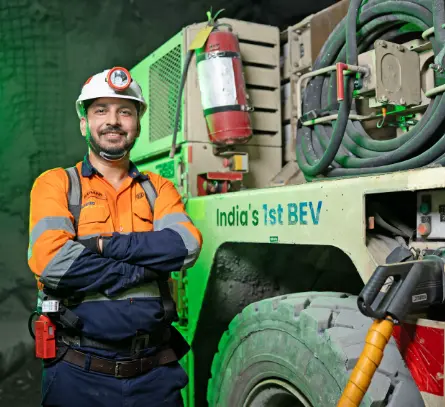Sustainability
Progressing on our sustainability commitments
At Hindustan Zinc, sustainability is a core factor influencing our long-term growth strategy. Guided by our ‘Zero Harm, Zero Waste and Zero Discharge’ vision, we are tangibly progressing towards a sustainable future, aiming for the SBTi-validated target of Net Zero by 2050 or sooner.

We are actively reducing our carbon footprint, optimising resource usage, nurturing natural ecosystems, and prioritising social responsibility and operational excellence, ensuring sustainable development for generations to come.
OUR APPROACH TO SUSTAINABILITY
Sustainability Framework: Our Sustainability Compass
At Hindustan Zinc, we have adopted a Sustainability Framework from our parent company Vedanta, which is aligned with (International Finance Corporation) IFC & (International Council on Mining & Metals) ICMM guidelines. This serves as comprehensive guidance to ensure sustainability in operations and decision-making across the business. This framework comprises a suite of sustainability policies, standards and guidance notes to steer operational and social excellence.
Sustainability Assurance Programme
The Sustainability Assurance Programme acts as a vital tool for evaluating the alignment of our sites against the Sustainability Framework. Annually, each site is systematically assessed to measure the extent of the implementation of the framework and provide site-specific sustainability scores based on 13 key pillars. The outcomes of the assessment are discussed in the Executive Committee, which in turn reports to the Board.
Based on the identified improvement areas, the respective units formulate management plans and implement corrective actions, which are periodically reviewed, evaluated and documented. To drive accountability and compliance, this score is linked with incentives for the leadership and employees. 10% of the annual performance bonus is linked to the score. Additionally, long-term incentives are also linked to the broader ESG performance of the Company.
Sustainability Assurance Programme Elements
Compliance
Leadership
Objectives, Targets & Performance
Safety
Competency & Training
New Projects
Process Safety & Management of Change
Incident Investigation
Assessment and Continual Improvement
Supplier & Contractor Management
Social Sustainability & Stakeholder Engagement
Environment
Occupational Health
Extending Sustainability to Value Chain Partners
As a responsible corporate, we have consciously extended our sustainability culture to our customers and suppliers, key stakeholders for Hindustan Zinc. We have built our customer service proposition around our wide portfolio of products and transparent disclosure of the environmental impact of our products. This is achieved through environmental product declaration (EPD), an independently verified and registered document.
EPD for Zinc Product: Prioritising environmental transparency
We have published an EPD for our zinc product, underlining our commitment to sustainability, transparency, and minimising our environmental footprint. The EPD uses life cycle assessment (LCA) methodology to measure the environmental performance of zinc products, considering the potential impact from each stage of manufacturing, product use, and end-of-life.
Our zinc EPD complies with ISO 14025:2006 and EN 15804:2012+A2:2019 standards to ensure comparability with EPDs from other manufacturers worldwide. Our LCA study was also benchmarked to the highest standards of ISO 14040 and ISO 14044.
EcoZen: Low Carbon Zinc
In July 2024, Hindustan Zinc launched Asia’s first low carbon zinc offering for its customers worldwide. Certified as low-carbon zinc by a renowned global sustainability consulting firm through a life cycle assessment (LCA), EcoZen boasts a carbon footprint of less than one tonne of carbon equivalent per tonne of zinc produced. Manufactured using renewable energy, the carbon footprint of EcoZen is about 75% lower than the global average.
Supply Chain Sustainability
As part of responsible sourcing, 100% of our critical suppliers were assessed for ESG Risks. As part of lowering carbon footprint, some of our initiatives include introducing electric vehicles (EVs) and liquified natural gas (LNG) vehicles. Further, we conduct business partner engagement and capacity building through our initiatives, ‘Business Partner ESG Connects’ and ‘Wednesday for Transition’.
PUTTING SUSTAINABILITY AT THE CORE
Setting priorities to advance sustainability efforts
Be the ESG leader
Investing in industry-leading initiatives to drive inclusive and sustainable development
Go beyond resilience
Undertake game-changing innovations and technological interventions
Creating value for our stakeholders
Undertake targeted initiatives to address stakeholders’ expectations and aspirations, and create long-term value
Following management systems across all sites
ISO 14001
Environment
ISO 45001
Occupational health and safety
ISO 50001
Energy
ISO 9001
Quality
ISO 31000
Risk Management
ISO 37301
Compliance
ISO 27001
Information Security
ISO 27701
Privacy Management
ISO 22301
Business Continuity & Disaster Recovery
OUR SUSTAINABILITY GOVERNANCE FRAMEWORK
Strong sustainability governance is responsible for building a responsible business. Sustainability is discussed at all Board and management meetings, as well as at the business unit (BU) management meetings. Our three-tier sustainability governance framework encompasses all ESG aspects, allowing us to set short-term and long-term goals and systematically monitor performance.
Our three-tiered sustainability framework
Tier 1 Sustainability and ESG Committee of the Board
Committee details
Comprises four Directors and holds half-yearly meetings, chaired by an Independent Director
Committee mandate
Providing oversight of ESG matters and proactively driving our ESG journey
Tier 2 Sustainability Committee at Executive Level
Committee details
- Chaired by the Chief Executive Officer
- Members include the entire Executive Committee and the Chairmen of our 12 communities
The 12 Sustainability Communities
- Energy & Carbon Community
- Water Management Community
- Corporate Social Responsibility (CSR) Community
- Finance Community
- Waste to Wealth Community
- Central Occupational Health & Safety Council
- Supply Chain Community
- Social Performance Management Committee
- Biodiversity Community
- People Community
- Communication Community
- Tailings Community
Committee mandate
- Formulating a sustainability strategy and setting long-term goals and targets
- Resource allocation to achieve our sustainability vision
- Tracking project status and reviewing progress toward the goals
Tier 3 IBU ESG Committee
Committee details
IBU ESG Committees are chaired by IBU CEOs and include the site-level community heads
Committee mandate
- Executes projects under the guidance provided by Tier 1 and 2 committees for achieving our sustainability vision
- Continuous identification, impact analysis, mitigation and monitoring of SBU-specific risks
ESG SCORECARD
Climate Change
Sustainability Goal 2025
UNSDGs
Goal
0.5 mn tCO2e GHG emission savings in our operations
Base Year
FY2017
FY2025 Progress
0.67 mn tCO2e GHG emission savings
Sustainability Goal 2030
Accelerate adoption of mitigation and adaptation measures to achieve:
50% reduction in Scope 1 and 2 emissions
25% reduction in Scope 3 emissions
Achieve Net Zero emission by 2050 or sooner
Water Stewardship
Sustainability Goal 2025
UNSDGs
Goal
- 5x water positive
- 25% reduction in freshwater consumption
Base Year
FY2020
FY2025 Progress
- 3.32x water positive
- 6% reduction in freshwater consumption
Sustainability Goal 2030
Achieve 50% reduction in freshwater consumption in operations from the 2020 baseline, thereby contributing to increased freshwater availability for communities within the shared watershed
Securing 100% low-quality water for smelting operations
Engage with supply chain partners to assess and manage water footprint in water-stressed area
Circular Economy
Sustainability Goal 2025
UNSDGs
Goal
3x increase in gainful utilisation of smelting process waste
Base Year
FY2020
FY2025 Progress
2x increase in gainful utilisation of smelting process waste (>6 lakhs MT)
Sustainability Goal 2030
Aiming to achieve near to zero waste to landfill by diverting all smelting process waste away from landfill through reuse, recycling and recovery
Biodiversity Conservation
Sustainability Goal 2025
UNSDGs
Goal
Protect and enhance biodiversity throughout the life cycle
Base Year
FY2020
FY2025 Progress
- Restoration of the habitat with 0.74 million trees additionally planted from the base year
- As part of our 3-year engagement with International Union for Conservation of Nature (IUCN), Biodiversity Management Plans have been developed for all sites
Sustainability Goal 2030
Halting and reversing biodiversity loss by 2030 from a 2020 baseline, through measurable gains in the health, abundance, diversity and resilience of species, ecosystems, and natural processes
Plan and strive to achieve no net loss of biodiversity at all mine sites by closure through application of mitigation hierarchy
Responsible Sourcing
Sustainability Goal 2025
UNSDGs
Goal
100% responsible sourcing in the supply chain
Base Year
FY2020
FY2025 Progress
95% critical suppliers assessed on ESG and risk management
Sustainability Goal 2030
100% active supplier evaluation on ESG & Risk Management
Achieve 25% of total procurement spend from local business partners (includes contracting & sub-contracting spend) by 2030 from base year 2025
Transition to greener fuels for advancing Scope 3 emission reduction
Zero Harm
Sustainability Goal 2025
UNSDGs
Goal
- Zero fatalities
- 50% reduction in total recordable injury frequency rate (TRIFR)
Base Year
FY2020
FY2025 Progress
- 4 fatalities*
- 55% reduction in TRIFR
Sustainability Goal 2030
Contribute to reach Zero Fatality and 100% elimination of high consequence work related injuries
*Including 1 at our subsidiary, Vedanta Zinc Football & Sports Foundation
Social Impact
Sustainability Goal 2025
UNSDGs
Goal
Positively impact one million lives through sustained CSR initiatives
Base Year
FY2020
FY2025 Progress
2,362 villages and 2.3 million people reached through sustained CSR initiatives
Sustainability Goal 2030
By 2030, complete Social and Human Rights Impact Assessment (SHRIA) at all major sites and implement site-specific Social and Human Rights Management Plans (SHRMPs) to respect human rights, support vulnerable communities, and promote inclusive growth
Impacting 0.5 million lives directly through economic enhancement & improving the quality of life
30,000 individuals made employable through skilling and entrepreneurial opportunities by 2030
Diversity in Workforce
Sustainability Goal 2025
UNSDGs
Goal
30% workforce diversity
Base Year
FY2020
FY2025 Progress
Gender diversity among executive employees enhanced from 14.4% in FY2020 to 25.5% in FY2025
Sustainability Goal 2030
Increase gender diversity to 30% with a strong focus on decision-making roles, to foster an inclusive and diverse workplace
Note: Baseline for all Sustainability Goals 2030 is FY2020
ESG RATINGS AND RECOGNITIONS
Sustained S&P Corporate Sustainability Assessment Leadership (Metal and Mining Sector)
Hindustan Zinc continues to demonstrate global ESG leadership, securing the #1 ranking globally in the metals and mining sector in S&P Global Corporate Sustainability Assessment 2024 for the second consecutive year. The overall improved score of 86 (up from 85 in the previous year), coupled with distinction of featuring in Sustainability Yearbook 2025 amongst the top 1% most sustainable organisations globally for the second consecutive year, corroborates Hindustan Zinc’s relentless commitment to sustainability and ESG excellence.
